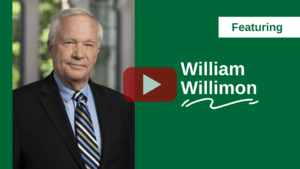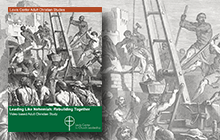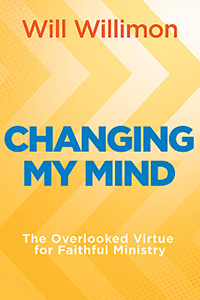
How can preachers overcome writers block? In this episode, William Willimon shares insights for pastors preaching during Holy Week. He discusses his book Changing My Mind, reflecting on how his views on preaching have evolved over five decades of ministry. Willimon shares insights into his sermon-writing process and underscores the necessity of listening—to God, scripture, and people—and encourages preachers to find their voice by learning from others while staying faithful to the gospel.
Listen on Apple Podcasts | YouTube Music | Spotify
Watch on YouTube

- Transcript—Click or Tap to Read
-
Announcer: Leading Ideas Talks is brought to you by the Lewis Center for Leadership of Wesley Theological Seminary in Washington, DC. Subscribe free to our weekly e-newsletter, Leading Ideas, at churchleadership.com/leadingideas.
Leading Ideas Talks is also brought to you by Leading Like Nehemiah: Rebuilding Together. This six-session video-based study curriculum lifts up key themes in Nehemiah’s witness that can inspire and guide faith leaders today. Learn more, watch an introductory video, and view sample Study and Discussion Guide pages now at churchleadership.com/nehemiah.
How can preachers overcome writers block? In this episode, William Willimon shares insights for pastors preaching during Holy Week. He discusses his book Changing My Mind, reflecting on how his views on preaching have evolved over five decades of ministry. Willimon shares insights into his sermon-writing process and underscores the necessity of listening—to God, scripture, and people—and encourages preachers to find their voice by learning from others while staying faithful to the gospel.
Jessica Anschutz: Welcome to Leading Ideas Talks, a podcast featuring thought leaders and innovative practitioners. I am Jessica Anschutz, the Interim Director of the Lewis Center for Church Leadership, and I am your host for this Leading Ideas Talk. Joining me is Will Willimon, a retired United Methodist Bishop, Professor of the Practice of Christian Ministry at Duke Divinity School, and author of Changing My Mind: The Overlooked Virtue for Faithful Ministry. Thank you so much for taking the time to speak with me today, Will, about preaching.
William Willimon: Oh, thank you so much, Jessica. I am indebted to the Lewis Center and your good work, and enjoy listening to the podcast. So, thanks for having me.
Jessica Anschutz: We’re grateful to count you among our listeners and also as a featured guest. To provide a little bit of context for our conversation, I want to invite you to share a little bit about how you came to write Changing My Mind and to share a little bit about the book.
William Willimon: Changing My Mind is kind of memoir-ish, looking back through the lens of how I’ve changed in ministry. Some things that I thought I knew for sure in the beginning that turned out to be differently in the end. And as I say, in the beginning of the book, some of that change is due to, well, the world changes. Culture shifts. During the course of my ministry of five decades, we’ve been through some seismic shifts, particularly the last 20 years. However, also, we work for a living God who is constantly on the move and who is determined to win back this world that is God’s.
So that means that if you answer the call to be a Christian leader—be a pastor, a preacher—you better be ready for adaptation and change. And the book takes 1st and 2nd Timothy and reads ministry through these letters from an older, experienced, seasoned pastor: St. Paul, to a younger, valued colleague: Timothy. So, I thought it would be fun to look at the ways I’ve changed and what I think I’ve learned through the lens of 1st and 2nd Timothy.
Jessica Anschutz: I really appreciated the way you wove the biblical narrative and your story together. And also, how at the beginning of each chapter, you highlighted your thoughts before your practice of ministry over five decades changed your mind. So, how has that practice changed your mind about preaching?
William Willimon: I rather provocatively say in the chapter, preaching is the most important thing you do as a pastor. I liked to preach. I feared preaching. I was kind of intimidated by it in the beginning, but I enjoyed it. However, I think I learned that… and when in the Southeast where I began ministry, lay people would often address you as preacher. “Preacher Will… preacher this… preacher that…” and I would chafe at that a little bit saying, “Oh, but I’m a pastor. I do lots more things than preach.” However, over the course of my ministry, I think I learned that preaching is just at the center.
In preaching, we’re identified as spokespersons for the Lord. In preaching, we wrestle with the biblical text. Our ministry is held accountable to the biblical text on a weekly basis. We are forced to do business with the biblical text on a regular basis. And at the same time, that it’s our time to articulate the gospel, to clarify the gospel. I know I say in the book that once a pastor told me that he was taking early retirement because he said, “I’ve been at this church 10 years and during the fight over mask mandates, I watched an otherwise placid church, pick up sides and kill each other off. I discovered my people couldn’t tell the difference between a Republican and a Democrat and a Christian.” If that’s true—and that certainly struck a bell with some of my experiences—if that’s true, then preaching… we live in a time where there is a great need for articulation of the gospel, and for telling the story again, and again, and differentiating the gospel, “Good News,” from a lot that passes for news in the world. And so, in a way, if America is politically in a crisis of constitutional democracy, all the more reason to go back and say once again that which has convened us; namely, the Good News that in Christ, God is reconciling the world to himself.
Jessica Anschutz: Amen. As we think about preaching being the, as you say, the most important thing you do in ministry, I’m curious about your approach to sermon writing. What does your process look like? How has that process changed over the course of your ministry?
William Willimon: I often get that question and it’s a great question in the sense that preaching is not simply about good ideas. In preaching, we have to have something to say, but we also have to struggle with how to say it. And by the way, I’m not embarrassed by that—artifice in preaching, the craft of preaching. Because when I read, like the Gospels, I realize it is fascinating. Here are different perspectives on Jesus. Let me tell you a story about Jesus. It’s a journey. It begins with people being called out and a journey. Wow. In other words, from the very beginning, people have had to struggle with how to bring the truth of Jesus Christ to speech. Preaching does that.
How do I do that? I remember the early days of my preaching, a good bit of study and struggle. I remember having a few commentaries that I went to that, that I found helpful. I must say during the course of my ministry—with the development, the use of the Revised Common Lectionary as a source for preaching—we have more preaching aides for the preacher who wants to be a biblical preacher maybe than we’ve ever had in the history of the church. That part sort of came easier in that I didn’t have to dig out stuff out of the commentary. It was often presented to me, the up-to-date scholarship through lectionary commentaries. And then, I always try to read the lection, and I’ve generally found the lectionary a nice way to stimulate me as a preacher and to force me to preach things that I wouldn’t normally preach left my own devices. I like to read scripture aloud. I like to also immediately note what catches me in the scripture. Most of my hearers, it’s going to hit them cold. So, what’s the first impression of this text?
I think it was Eugene Lowry that taught me to ask, when reading a biblical text, “Look for the weird.” What in this text is dissonant? How does this text surprise? You won’t want to lose that in your further development of the sermon. So, I like to write that down. Then I like to go to the commentaries; the lectionary commentaries, and I’ll dig into the passage. There, I’m sort of saying, “Hey, biblical expert, show me something I missed or correct my first impressions.” Then, I also like to jot down first impressions that come to me, connections that I think I have, because it’s going to be your task to move from that text to your specific congregational context where that really hits home. In fact, I ask pastors, “When do you start working on a sermon?” Well, there’s a sense in which a pastor can’t answer that definitively. In a sense, you started working on this sermon 10 years ago. You’ve been wrestling with this text over the course of your ministry.
Great thing about being a pastor is, in a sense, people will tell you what to preach, if you just have enough conversation. In fact, in the book, I define preaching in this way; a preacher enters a conversation that has been going on between God and God’s people. You contribute to the conversation with your sermon, and then you spend the rest of the week seeing where God will
take the conversation from here. And that makes the task of preaching joyful. And it’s also a reminder that I’m not the only preacher. Jesus Christ is busy speaking for himself. He is busy intruding and revealing. And it isn’t like I’m engaged in some heroic, impossible feat in preaching. I’m merely contributing to the conversation. It’s going on between God and God’s people. It’s a great way to go.
 Leading Like Nehemiah: Rebuilding Together is a six-session video-based study curriculum that lifts up key themes in Nehemiah’s witness that can inspire and guide faith leaders today. The accompanying Study and Discussion Guide provides scriptures, introductory information, discussion questions, and prayers to structure group conversations on the subject of each video. An e-book is also included with the study or may be purchased separately. Learn more about the study and e-book now.
Leading Like Nehemiah: Rebuilding Together is a six-session video-based study curriculum that lifts up key themes in Nehemiah’s witness that can inspire and guide faith leaders today. The accompanying Study and Discussion Guide provides scriptures, introductory information, discussion questions, and prayers to structure group conversations on the subject of each video. An e-book is also included with the study or may be purchased separately. Learn more about the study and e-book now.
Jessica Anschutz: It is a great way to go. And I really appreciate your emphasis on listening. Listening to the spirit, listening for God working not only in your own life, but in the lives of those around you. You write in the book that we preachers find our own voice through imitation. And I want to invite you to share what this has looked like for you, and also, how do you listen to other’s sermons? What can we learn from listening to other preachers?
William Willimon: Well, I found that a lot of students of preaching, as they’re starting out, feel guilty about imitation. “I want to come up with my own sermon.” “I want to speak for myself.” Well, in truth, none of us speaks that way. We all are recipients of a language that has been bequeathed to us—that has been inculcated in us. We’re in a company of preachers, to use a biblical phrase, in that preaching is a kind of joint activity. In a sermon. I’d like to talk more like my parishioners talk in order to get a hearing from my parishioners. I’d like to talk less in the way that I’ve been trained to talk by going to seminary and all.
I think of dear John Wesley, who said to his traveling preachers, he handed them a copy of his 52 sermons, and he said, “Here, preach these before you attempt any of your own.” And so imitation is there. One of the tasks of learning to preach is get some good people to imitate. Who has moved you? Who have you heard that you say, “Gosh, I’d like to be able to do that before long.” What sermons have changed you? I know I was with a group of pastors, and we were talking about preaching on race, preaching about the racial sin in America and all. And I just said, “Has anybody here been changed on race through a sermon?” Well, one thing we noted was not many had, only a couple of people. Well, those couple of people, we said, “Well, tell us about that sermon. What, what did you hear in that sermon?” Now, some of the times, what you hear is, I mean, that’s the job of the Holy Spirit to incite the sermon in you. On the other hand, we look for kind of common themes. One of the things we said was, basically, a preacher stood up and said, “Here’s how the Lord has changed me from my white supremacist roots to where I am now.” And we found that, you know, giving personal testimony is better than saying, “Hey, I’ve solved this problem. Now let me help you solve it for you.”
And I gotta say, it’s a golden age for imitating today. When I was a young preacher, I was desperate to hear other preachers, and I would put my little cassette recorder (many of our hearers have no idea what a cassette recorder is), but I put it up next to the radio at the Protestant Hour, and it recorded Edmund Stimely, and then I would play that tape as I would travel around to the hospitals during the day. Well now, I can hear six or seven sermons before breakfast, if I want to on the web, and it’s wonderful. And I love roaming around on the web. I love putting in a scriptural passage there, and then roaming around and seeing how other people deal with it. So, I think imitation is essential to finding your own voice.
And I specifically, Fred Craddock for me was somebody who—I don’t know that I imitated him—but in listening to Fred Cradock and inculcating his approach to preaching, he gave me permission to be the kind of southern storyteller that I was bred to be and freed me. I’ve noted women preachers for instance. This can be a challenge because there’s not as many women preaching preachers to hear as models. But finding those models. If you ask me a couple of people that I’ve used as models. I think of a couple of women: Barbara Brown Taylor, I think of Flemmy Rutledge, I think of Elizabeth Achtemeier. I don’t know if I imitated their style, but I tried to imitate their boldness and their confidence that God’s word was a word that was worth hearing.
Jessica Anschutz: There are so many ways that we can learn from and draw from listening and hearing one another’s stories, whether that’s in a formal context of a sermon or as you’ve highlighted in sort of your day-to-day interactions with folks. I was struck by your writing in the book when you were talking about serving as an associate pastor early in your career of ministry, and some of the feedback you received from someone you identify as Mrs. Bunker, saying, “You call that a sermon?!” I feel like most preachers have had a similar experience. And I would love for you to share about what you learned from that experience, and also what wisdom you would offer to preachers in how to respond to what they may receive as negative or hurtful feedback.
William Willimon: I remember having a group of four preachers before my class at one point, and one of the students asked this question about what do you do with negative feedback? What do you do when you get negative comments about a sermon you’ve delivered?
The students noted—all four of those preachers—none of them regarded negative feedback as negative. And in fact, a number of them, sort of took delight in reporting, “I had a subject. I wanted to do it well. I wanted him to get the point. Well, someone came out and said, I was really upset by what you said.” And he said, “I thought to myself: huh…I succeeded. I got my point across.” Negative feedback is feedback. One, I say to preachers: if you get negative feedback, congratulations. You evidently have a very good relationship with this person. It takes a lot of courage to criticize a preacher, generally. But then you also got to say, “I wonder, is this useful feedback? Does the feedback say more about the listener than it does about me as a preacher or my sermon?” Also, I think we have to discipline ourselves to get a little distance between us, ourselves, and the sermon. To say, “I didn’t like that sermon” may not be taken as “You’re a bad human being and a failure as a preacher.” It’s just, “I don’t like that sermon.”
Two: We desperately need feedback to grow. I don’t know any way there is to grow as a preacher without feedback. And sometimes the negative feedback is more helpful than the positive. On the other hand, I would say too that I know preachers who are in what I consider to be pathological congregations, where “Let’s all get the preacher” has become a way of life. Some people exercise their own power in the congregation by occasionally beating up on the preacher, keeping the preacher in line. That also can happen. But I’d say to a preacher, before you dismiss negative feedback as just some kind of nut or a crank or somebody who’s got problems in their own lives they’re trying to transfer to you… before you do that, just consider the fact that this person may be telling you some information that even your best friends in the congregation don’t care enough about your preaching to give you.
And one last thing about negative feedback. Sometimes negative feedback shows that lay person has more invested in that sermon even than you do, as the preacher of the sermon. And I tell the story about the guy who came—I’d been warned about him—that on the previous pastor, he’d walked out in the middle of the sermon twice. So, I had my eye on him. Well, sure enough at the end of a service, he comes up to me and says, “I tell you; I just don’t see it the way you say it. Sometimes you, you just kind of overstate things, and you come on too strong.” And so, I immediately got defensive, and said, “Now, Wally maybe I did overstate that. We only have 20 minutes for the sermon, and I can’t properly qualify every statement.” And he stepped back, and he said, “Well, did you mean what you said or not? I didn’t ask you to take it back. I just told you I found it hard to hear. Don’t take it back.” Then he said to me, “Preacher, you’ve never worked or had a job, so maybe you wouldn’t know. But I run a hardware store, and you can learn to run a hardware store in about six months. I’ve been there 20 years. The only time during the week anybody takes me seriously, the only time during the week anybody talks to me like they think I got a brain, is on Sunday morning.” And he said, “I take notes, and there’s a guy at the hardware store that works for me that I kind of tell him what the preacher said on Sunday.” And he said, “Don’t take it back.”
It just reminded me that part of growing as a preacher and continuing as a preacher is dealing with feedback. By the way, I’ve done a book on this called A Listener’s Dare. And it’s a book about how to listen to a sermon, what it’s appropriate to ask of a sermon, and maybe how to get better lay response to sermons that’s helpful to us as preachers.
Jessica Anschutz: Thank you so much for lifting up that other resource, Will. I really appreciate that. We are fast approaching the Lenten season, and a number of preachers may be facing their first time going through Holy Week as a pastor. And I’m wondering what advice you would offer to preachers during Holy Week, and especially to those experiencing their first Holy Week?
William Willimon: Well, in coming up on Holy Week, we are going to the epicenter of the gospel. This is what it’s all about. We’re also entering the time when we, through the lectionary and all, get to read some of the greatest work in scripture – the most vivid passages. We’re also coming to some of the hardest to hear material. Jesus Christ, Son of God, savior of the world came among us and offered us mercy, and we responded, “Crucify him!” We voted for Barabbas when asked for an up or down verdict on Jesus. So that says a lot about Jesus—says a lot about us—and Holy Week and Lent, are when the church dares to explore the mysteries of our sin, death, our salvation, the cost of loving people like us. All of that are Lenten themes. And I think maybe it’s a reminder that Lent could be one of the most politically challenging, culturally clashing seasons of the year. I get out of a car, my car in the parking lot, and I look and there’s a car next to me with a bumper sticker and the bumper sticker says, uh, “Jesus is my savior, Trump is my president.” And I think, “Wow. We’re going to be busy during Lent, won’t we? We’ve got a lot to talk about, people. There seems to be some confusion here.” And the worship of a crucified Savior, one who in the words of Bonhoeffer, allowed himself to get pushed out of the world on a cross. Part of the challenge of the present moment is a lot of Christians think, “We can get worldly power. We can get power to do what we want to do, and we can call that power Christian.” No. Jesus comes into town on Palm Sunday, bouncing in on the back of a donkey, welcomed by a bunch of kids. Then he goes and wreaks havoc at the temple—at least in Luke’s gospel and Matthew—and ends up being tortured to death by a consortium of government religious officials: That’s God. Well, we get to talk about that. And then, the surprise: that God said no to our no; that God rejected our rejection in the resurrection.
Jessica Anschutz: What a powerful reminder of the privilege we have in sharing that story and reflecting on it. As we think about moving into the celebration of the resurrection at Easter, I was talking with a preacher recently who said, they were reflecting on the passage that they were going to be preaching on, and they said, “I think I’ve preached everything there is to preach about this passage,” and they were struggling to come up with a new idea. What would you recommend for a pastor preparing for Easter and experiencing writer’s block?
William Willimon: The pastor’s on to something there in the sense that I say to students, “When you study the prescribed lection for that Sunday, if nothing grabs you in it, even after you’ve tried to dig in with some help from others, commentaries and all: if nothing grabs you, forget it. Don’t, don’t try to preach on it.” I like what Tom Long says: the biblical preacher goes to the biblical text, hoping to make a discovery. And then, in the sermon, you announce that discovery to the congregation. And discoveries beg to be shared. Discoveries are engaging and energizing. It’s not energizing to say what we’ve always said before and thought.
And one great thing is you got the Holy Spirit that appears to just love to surprise. And then you got the biblical text, which by its very nature tends to be multilayered – thick. I was studying one of Jesus’ parables yesterday, and it occurred to me that I have been through this parable in at least 20 to 25 sermons. And well, okay Tom Long, in your book on parables, show me something. Tell me something I didn’t know. And darn it, he did. He showed me and I thought “Whoa! You’ve just destroyed about eight of my sermons on this passage, but you’ve given me a new sermon on the passage. Thanks, Tom.”
You know I can imagine there are times too for us preachers when, you know, we if we get out of bed, and say “Oh Lord. Holy Week. Again!” I think, check yourself out. Maybe it’s time to step aside. This is in the Wesleyan spirit. What disciplines maybe do you need to develop that you’ve been neglecting that will bring you closer to the living Christ, who is dying to talk to his people. I gotta say though, when you were saying a pastor talking about a sense of “Oh, no, here again.” I thought, you better be as old as I am to make a statement like that. I’m amazed at my advanced years, I mean, look at me. The biblical text still manages to excite me week after week. I hope the rest of you preachers will take hope in my saying that. Preaching, I find, is a wonderfully renewable resource for the biblical preacher.
Jessica Anschutz: I like that. I don’t know that I’ve heard it described as a renewable resource before, but I love that. Approaching the text knowing that it has so much to offer us and that in combination with our living God has the power to really, not only transform us as preachers, but those who will hear us in our preaching.
William Willimon: Maybe our great hope is: Jesus came preaching, and he continues to speak for himself. And maybe we preachers ought to take heart—particularly during this moment of the mainline North American church—take heart that Jesus really wants to have his say. He will have the last word, and he wants us to succeed at this. What an adventure it is to preach with a living God who is determined to speak.
Jessica Anschutz: Indeed, it is. I have so enjoyed our conversation today. I’m mindful that our time is really drawing to a close, but I want to remind our listeners about your latest book, Changing My Mind: The Overlooked Virtue for Faithful Ministry. We will link to that on our podcast page, so folks can easily find it. And as we wrap up, what is your hope for preachers in the Easter season?
William Willimon: My hope for preachers in the Easter season is that the stories about cross and resurrection that we’ll be reading, they’ll hope—hope that they’re true. If they’re not true, then preaching is one of the dumbest ways to make a living I can imagine. If they are true, then there is hope. And there’s no obstacle, no difficulty we face right now in the present moment that they did not face, the first preachers. A reminder, too, that when, the women go out to the tomb on Easter morning in the darkness—where were the male disciples? Well, that’s another story. But the women go out there to dress a dead body, one last respect for poor dead Jesus only to be met by this figure in white who says, “What are you out here looking for the living among the dead? Go… tell… He’s risen.” The first preachers were women, the first evangelists. And they run back, and they say to the despondent male disciples cowering behind locked doors. “Hey, it ain’t over. It’s just beginning. He’s loose!” That, I think, is our hope—that that story is true.
Jessica Anschutz: Amen. Well, thank you so much for joining us today. We’re delighted to have you.
William Willimon: Wonderful to be with you, and thanks for the good work that Leading Ideas does for us.
Announcer: Don’t forget to subscribe to our free weekly e-newsletter, Leading Ideas, to be notified when new episodes are published. Visit churchleadership.com/leadingideas.
Changing My Mind: The Overlooked Virtue for Faithful Ministry (Abingdon Press, 2024) by William Willimon is available from the publisher, Cokesbury, and Amazon.
Related Resources
- How to Keep Preaching Fresh featuring Teresa Fry Brown — Watch the Leading Ideas Talks podcast video | Listen to the podcast audio version | Read the in-depth interview
- Leading with the Sermon featuring William Willimon — Listen to the Leading Ideas Talks podcast | Read the transcript
- Preaching Truth in the Age of Alternative Facts by William Brosend
- 4 Opportunities for the Church in the Current Political Tension by Carey Nieuwhof
If you would like to share this article in your newsletter or other publication, please review our reprint guidelines.





